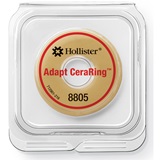Overcoming Cancer and Embracing Life With Two Stomas
At age 52, Ross Davidson received a stage 3 rectal cancer diagnosis and underwent ostomy surgery. But instead of letting his circumstances hold him back, he is determined to live life to the fullest.

Learn how resilience and a positive attitude helped Ross move forward
In June 2018 Ross, who lives in the UK, was diagnosed with rectal cancer. He underwent intensive cancer treatment, including a surgery resulting in two permanent stomas – a colostomy and a urostomy. Although he was deeply grateful for the presence of his stomas, which saved his life, the permanent change to his anatomy was a constant reminder of what he had left behind.
Shortly after his surgery, however, someone wisely pointed out to him that it’s entirely natural to go through a grieving process when bidding farewell to your old self. This observation resonated with Ross; he experienced a sense of loss and helplessness as he moved beyond the initial recovery phase and resumed his daily life. However, Ross also believed that, with time and effort, he would learn to adapt to his new circumstances and embrace the possibilities that come with having a stoma.
Staying active through cancer treatment and ostomy surgery
Throughout his life, Ross has been physically active. His preferred exercise is running, but he also enjoys weightlifting, indoor rowing, cycling, and yoga. Maintaining physical fitness has been essential for Ross, not only as a way to stay active, but also as a stress reliever and booster of his overall well-being. He was shocked to be diagnosed with cancer given that he had a reasonably healthy lifestyle.
"Throughout my treatment, I was determined to stay as physically fit as possible,” says Ross. “After doing some research, I discovered that keeping active while receiving chemotherapy is associated with more favorable outcomes – so despite the increasing levels of fatigue I experienced, I made sure to maintain my activity levels."
Ross underwent 12 weeks of chemotherapy, followed by five weeks of chemoradiotherapy. Then, in March 2019, he had total pelvic exenteration (TPE) surgery, which is an extreme procedure involving the removal of all pelvic cavity organs. "I spent eight hours in the operating theatre with three surgical teams working on me – colorectal, urology, and plastic surgery for reconstruction – followed by a recovery period of 18 days in the hospital," Ross explains. "I was left with two permanent stomas and a fight to adjust to a new way of life.”
The exhaustion he felt in the first week after the surgery was overwhelming, but after a couple of days the physiotherapists came by to encourage him to get moving. “Those first attempts to get out of bed were incredibly tough,” says Ross. “I dreaded seeing the physios come onto the ward.”
But Ross persevered, attempting to achieve a bit more in every session, and within 10 days he progressed from barely being able to sit up straight to walking with his IV stand and doing laps around the ward. “I challenged myself to go a bit further each day, and completing those walks gave me an immense sense of purpose,” said Ross. “By exercising and getting my body to work again, I was slowly reclaiming my sense of identity."
A life-changing experience
Going through chemotherapy and surgery and adjusting to life with two stomas had a big impact on Ross. He fully realized the physical and mental benefits of exercise, and decided to leave his job of 13 years in April 2021. In January 2022, he qualified as a personal trainer and he now plans to gain further experience – possibly by specializing in cancer rehabilitation and exercise programs for ostomates.
Ross has made steady progress from his early days of feeling grief and helplessness. He has become someone who eagerly anticipates future challenges and is not deterred from testing his limits. In fact, the presence of his stomas has become a driver for him to push himself further and achieve new things. With a fierce determination, Ross refuses to let his condition hold him back and instead uses it as motivation to live life to the fullest.
Ross received compensation from Hollister Incorporated for his contribution to this article. The testimonials, statements, and opinions presented are applicable to the people depicted. These testimonials are representative of their experience, but the exact results and experience will be unique and individual to each person. Please make sure to consult with your healthcare professional for further guidance and instruction. The information provided herein is not medical advice and is not intended to substitute for the advice of your personal physician or other healthcare provider.
- 10 Shares
- 20 Recommended





 Call Us
Call Us  Email Us
Email Us  Join Us!
Join Us!  Sign Up
Sign Up 